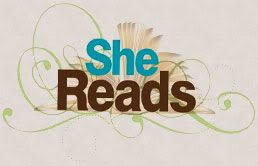
I have a confession to make. At 10:30 last night, I was curled up in bed with
The Help, trying to finish before our book club met at church, and I read this sentence:
"Copy's due on Thursdays. And if I don't like your style, I'm not printing it or paying you squat." Like a thunderbolt, the realization struck:
Copy's due tomorrow. Tomorrow is my turn to post on Novel Matters.
It was no use. By that time of night my brain was fried. I hope you won't stone me for sharing my last post from She Reads (our sister blog) with you instead. I'm wearing my hardhat, just in case. Here goes:
Occasionally I make the mistake of walking into a Michael’s store without a list. Inevitable sensory overload and the lure of cute scrapbooking doodads and glittery beads overwhelm me with possibilities. When I come out of my fog I’m wandering the seasonal aisle with pumpkins and scarecrows and fall leaves. In July. I’ve learned to make a list or at least stop at the entrance to drill myself on why I’m there before crossing the threshold.
I made a similar mistake yesterday when I walked into my local library without a book list. Now, you could put it down to ADHD (which I’m not) or chemo-brain fade (that was 13 years ago) or age (hey, I’m not that old) but I’ll bet you’ve done the same thing. I stood before the tall stacks of books ad infinitum and I couldn’t think of a single author or title I was looking for.
If you are a regular visitor of She Reads, you’ve discovered a way to find great books in the genres or markets that appeal to you. But if you happen to find yourself in a bookstore or library without your list, or if you like to read widely in both fiction and non-fiction or discover hidden gems, what do you do? How does a book make the list?
The book’s cover may be where you’d start. Publishers invest a lot of time and money in designing book covers to catch your eye and draw you in. The color, font and design send messages about the story. An Amish cap is unmistakable. Soft colors and a sweet font could be romance or cozy mystery. Historicals are dressed in period costume, and dark images are probably suspense or science fiction. But I checked out a book yesterday (based on the cover & title) that was none of the above. The bright yellow cover with a sweetly framed photo of a car driving down a country lane with two golden retrievers looking on seemed like a nice summer read. Wow. The language was – offensive. And I don’t offend that easily. Unfortunately, this didn’t become manifest until the third chapter in and I felt duped.
Unless the book is on an endcap or facing out, chances are the cover isn’t what you’ll see first. Most books are stacked side-by-side with the title running down the length of the spine. The publisher has about one inch of space to catch your eye. The font and color are important here, but the title and/or the author’s name carry the weight. I thought the (offensive) book I’d chosen had a cute title, but I’ll keep it to myself because I’m not recommending it. (Or finishing it either, for that matter.) If the book is part of a series, there will probably be a clue in the title and you might want to begin with the first one, although it’s usually not imperative.
When a book interests you and you pull it from the shelf, you’ll look first at the cover. Then you’ll probably flip it over to read the back copy. Sometimes, there are only endorsements from other authors or critics, and you have to look at the inside flap to get an idea of the story. Sometimes, not even then. At some point, you’ll flip open the book to the first chapter and read the opening sentence. This can make or break your decision to buy it or check it out. Here are a few opening sentences that convinced me to give these books a try:
“I was sitting in a taxi, wondering if I had overdressed for the evening, when I looked out the window and saw Mom rooting through a Dumpster.” The Glass Castle
“In the town there were two mutes, and they were always together.” The Heart is a Lonely Hunter
“I told you last night that I might be gone sometime, and you said, Where, and I said, To be with the Good Lord, and you said, Why, and I said, Because I’m old, and you said, I don’t think you’re old.” Gilead
“I am ninety. Or ninety-three. One or the other.” Water for Elephants
“It’s hard being left behind.” The Time Traveler’s Wife
By reading the first sentence, you’ll also get an idea of who is telling the story and what tense is being used, but it’s a good idea to flip through if you have a preference. I found one book which began in a perfectly normal viewpoint and multiplied exponentially – every other paragraph was in a different character’s viewpoint. I felt exhausted, just looking at it.
I have a small notepad in my purse now with titles listed that I can refer to the next time I’m cruising for a good book. Or craft supplies. Have you ever been fooled by a book cover or title that misrepresented the content? Do you have an opening sentence that you fell in love with and made you buy (or check out) the book? I’d love to hear.
 Be our 300th follower and win our cookbook, Novel Matters on Rice: What to Cook When You Would Rather Be Writing (or Vise Versa). Yes, you can download it for free, but this is a hard copy. Such a treasure! For the other 299 members, we love you to death, too!
Be our 300th follower and win our cookbook, Novel Matters on Rice: What to Cook When You Would Rather Be Writing (or Vise Versa). Yes, you can download it for free, but this is a hard copy. Such a treasure! For the other 299 members, we love you to death, too!
 Good villains aren’t born they’re created. Chilling as this sounds, it’s nice folks like you and me who are responsible for some of the most heinous characters in fiction. If you’re looking to write a story with staying power, a tome to remember, you need a great villain.
Good villains aren’t born they’re created. Chilling as this sounds, it’s nice folks like you and me who are responsible for some of the most heinous characters in fiction. If you’re looking to write a story with staying power, a tome to remember, you need a great villain.


























